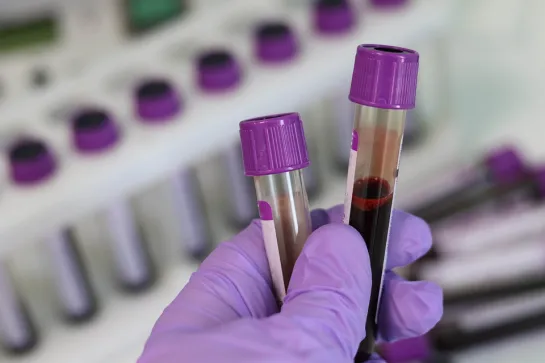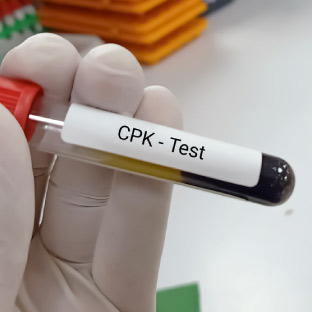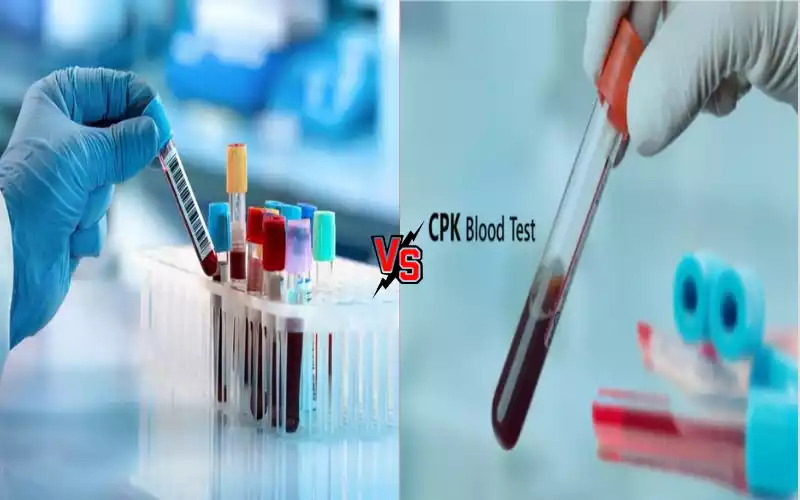CK and CPK Blood Test Best 12 Difference
Introduction of CK and CPK Blood Test
CK and CPK Blood Test are vital tools in the realm of medical diagnostics, offering valuable insights into muscle and cardiac health. While often used interchangeably, these tests serve unique purposes.
CK is a general marker for muscle health, helpful in diagnosing muscle injuries and diseases. CPK, a closely related enzyme, differentiates between specific isoenzymes, aiding in the diagnosis of heart attacks and distinguishing between muscle, cardiac, and brain-related issues.
In this exploration, we will delve into the distinctions, applications, and significance of CK and CPK blood tests in healthcare.
What is a CK Blood Test?
A Creatine Kinase (CK) blood test is a diagnostic procedure used to measure the concentration of creatine kinase enzyme in someone’s bloodstream. Creatine Kinase (CK) can be found predominantly in muscle tissues like skeletal and heart muscles.
But when muscle cells become injured they release CK into their bloodstreams providing a useful marker for monitoring muscle health.

This blood test is frequently utilized to diagnose and monitor various muscle-related conditions as well as cardiac issues, with elevated CK levels typically signaling muscle damage caused by trauma, strenuous exercise, muscular dystrophy disease (e.g. muscular dystrophy), myositis, or heart attacks.
Interpreting CK blood test results involves comparing measured CK levels against established reference ranges. While these ranges can differ between laboratories.
They generally serve as an accurate benchmark to establish whether or not elevated levels have occurred, providing healthcare providers with valuable information for diagnosing and managing related muscle and cardiac conditions.
When is the CK Test Used?
It is the CK (Creatine Kinase) blood test is utilized in a variety of clinical situations to evaluate the health of muscles and detect or monitor issues that affect muscle function.
Common scenarios in which this CK test is utilized are:
- Muscle Trauma or Injury: After a person is injured by a muscle because of accidents, injuries, or physical trauma, it is possible that the CK levels in blood could rise. This test helps determine the severity of damage to muscles.
- Muscle Diseases: Muscular dystrophy, myositis, and other muscular disorders can cause increased CK levels. The test can be used for the treatment and diagnosis of these diseases.
- Inflammatory Muscle Diseases: Inflammatory diseases of the muscles like polymyositis or dermatomyositis can trigger muscle inflammation and injury, which results in an increase in CK levels. Monitoring CK levels is a component of disease management.
- Strenuous exercise: Intense physical activity or exercise can cause temporary elevation of CK levels in the blood, particularly in athletes. Although this is typically benign and short-lived. It is worth monitoring for the purpose of understanding.
- Heart attacks (sometimes): While CK is mostly linked to the health of muscles which includes muscles in the skeletal region, it may be utilized together with other cardiac markers to identify an attack on the heart. CPK-MB (a particular CPK isoenzyme) is usually more precise in detecting heart attacks.
- Monitor Treatment: Sometimes healthcare professionals may employ CK tests to assess the efficacy of treatments to treat muscle-related ailments and ensure that CK levels are restored to normal levels as the treatment progresses.
Interpretation of CK Results
- Reference Ranges: CK levels can vary slightly between different laboratories, so it’s essential to compare the patient’s results to the specific reference range provided by the testing facility. The reference range is typically provided on the lab report.
- Normal Range: CK levels within the reference range are considered normal and suggest no significant muscle damage or disease. However, some individuals, such as athletes, may have slightly elevated CK levels due to exercise.
- Elevated CK Levels: Elevated CK levels can be indicative of various conditions.
- Muscle Injury: A significant increase in CK levels may indicate recent muscle injury or trauma.
- Muscle Diseases: Conditions like muscular dystrophy, myositis, or rhabdomyolysis can lead to substantially elevated CK levels.
- Inflammatory Muscle Conditions: Inflammatory muscle diseases like polymyositis or dermatomyositis may cause moderately elevated CK levels.
- Strenuous Exercise: Short-term elevation in CK levels can occur after intense physical activity but typically return to normal within a few days.
- Pattern of CK Elevation: The specific pattern and magnitude of CK elevation can provide additional diagnostic insights:
- Skeletal Muscle Damage: A predominantly elevated CK-MM isoenzyme suggests damage to skeletal muscles.
- Cardiac Muscle Damage: If CPK-MB levels are also elevated, it may indicate cardiac muscle (heart) damage, often seen in heart attacks.
- Brain Tissue Damage: Elevated CPK-BB levels could indicate brain tissue damage, although this is relatively rare.
- Clinical Context: Interpretation should always consider the patient’s clinical history and symptoms. Elevated CK levels alone do not provide a definitive diagnosis but rather signal the need for further evaluation, which may include imaging, additional blood tests, and a thorough medical examination.
Side Effects of CK Blood Test
Here are some possible adverse effects and other considerations:
- Discomfort or Pain: The most common adverse effect of CK testing is a minor discomfort or pain near the area where the needle is placed in order to collect blood. The discomfort is usually short-term and goes away within a short time.
- Abrasion or Hematoma: Sometimes, tiny bruises or hemorrhages (a small collection of blood) could develop at the point of needle insertion. The majority of the time, it is non-threatening and usually disappears over time.
- The Infection It is very uncommon in instances, where there’s the risk of developing an infection of the site of puncture. Healthcare professionals are careful to limit the risk by making use of sterile equipment and following the correct procedures.
- dizziness or fainting: Some individuals may be dizzy, lightheaded, or faint following having a blood test, particularly when they are scared of needles or have a past history of fainting. It is important to notify your health professional if you’ve had a history of these reactions.
- Nerve Injury (Extremely rare): In exceedingly rare instances, there may be a nerve injury or damage at the site of needle insertion. It is an uncommon complication and can occur in very rare circumstances.
What is the CPK Blood Test?
CPK (Creatine Phosphokinase) blood tests are diagnostic tools used to measure levels of creatine phosphokinase enzymes present in an individual’s blood.
CPK, commonly referred to as CK, is present in various tissues within the body including skeletal muscles, heart muscle, and brain tissue, and is classified into various isoenzymes depending on where its active enzyme resides in those organs.

This blood test plays an essential role in assessing muscle and heart health as well as pinpointing sources of tissue damage. There are three primary CPK isoenzymes:
1. CPK-MM for skeletal muscles 2. CPK-MB for heart muscle 3. CPK-BB (brain tissue).
CPK-MM levels indicate muscle damage or disorders such as muscular dystrophy. Elevated CPK-MB levels serve as an accurate marker of heart muscle damage, helping doctors diagnose conditions like myocardial infarction (heart attack).
Elevated CPK-BB levels could indicate brain damage from strokes or other sources. CPK-MM also tracks heart muscle health during myocardial infarctions (heart attacks).
Interpreting CPK blood test results requires comparing isoenzyme levels against established reference ranges, helping healthcare providers diagnose and monitor various medical conditions affecting muscles, the heart, or the brain.
When is the CPK Test Used?
- Diagnose heart attacks (Myocardial Infarctions): CPK-MB is an isoenzyme that is specific to CPK and is found primarily inside the cardiac muscle (myocardium). If a person suffers an attack of the heart and the heart muscle is damaged, it releases CPK-MB into the bloodstream. The elevated levels of CPK-MB, along and other markers of the heart, such as troponin, aid in confirming the diagnosis of an attack on the heart.
- Assessing Heart Health: The CPK-MB test is a way to assess the health that the heart is in people who have a history of heart disease or who are at risk. The changes in CPK-MB levels over time may provide important information regarding the progress of heart conditions.
- Differentiating Cardiac Muscle Damage: CPK-MB helps differentiate between the damage to the muscle that is specific to the heart, as well as damage to other muscles throughout the body, for example, the skeletal muscles. This is essential for assessing the health of your heart and identifying heart-related problems.
- monitoring cardiac procedures: CPK-MB levels can be monitored throughout and following various cardiac operations, like coronary artery bypass surgery, or angioplasty, to determine the effectiveness of the procedure as well as monitor for any potential problems.
- Evaluation of Chest Pain: If you experience chest discomfort or other symptoms related to the heart CPK-MB tests can form part of a series of tests that help determine if the discomfort is caused by a heart issue.
- Drug-Induced Damage to the Cardiac Muscle: Some medications or medications can damage the cardiac muscle. Monitoring the CPK-MB levels could be required for patients who are taking these drugs to identify the early signs of toxicity to the heart.
Interpretation of CPK Results
- Referring Ranges CPK concentrations, particularly CPK-MB, may differ among different labs. It is therefore essential to compare the results of a patient with the reference range set by the testing facility which is usually provided in the report of the lab.
- Normal range: CPK concentrations within the range of reference are thought to be normal and indicate no damage to the heart or muscles. However, there are some who be slightly elevated in CPK amounts due to a variety of aspects, including exercise.
- CPK-MB levels that are elevated: Elevated CPK-MB levels indicate the cardiac muscle (heart) is damaged. The increase is usually caused by conditions such as myocardial infarction (heart attack) or other heart-related conditions.
- CPK-MM and CPK BB The levels of The CPK-MM level indicates the condition of skeletal muscles, and CPK-BB levels are primarily related to brain tissue. Higher levels of CPK-MM could suggest problems with skeletal muscles or other disorders and elevated levels of CPK BB may indicate damage to brain tissue However, brain-related disorders are very rare.
- clinical context: Interpretation should always take into account the patient’s background and symptoms. A rise in CPK levels by itself doesn’t provide a definitive diagnosis, but they do indicate that there is a need to conduct further investigation that could include additional tests, imaging as well as a thorough medical exam.
- A pattern for CPK elevation: Specific patterns of CPK isoenzyme elevation could provide more diagnostic information. For instance, a dramatic rise in CPK-MB, along with other cardiac indicators (such as troponin) is a clear indication of a heart attack.
Side effects of CPK Bolld Test
Here are some possible adverse effects and other factors to consider:
- Pain or discomfort The most frequent result is a minor ache or discomfort in the area at which the needle was inserted in order to collect blood. This is usually short-lived and is not severe.
- Abrasion or Hematoma: Occasionally, an insignificant bruise or hemoglobin (a small, bloody collection) could develop near the site of the puncture. It is usually uninvolved and will disappear by itself.
- Difficulty or Fainting: Some individuals may be afflicted with dizziness, lightheadedness or even fainting after or following a blood draw. This is typically seen in those who are afraid of needles or who have a previous history of fainting during procedures. It’s essential to inform your doctor if you’ve had a history of these reactions.
- The Infection (Rare): There is a low chance of infection on the needle’s insertion site. Healthcare professionals are careful to reduce the risk of infection by making use of sterile equipment and following the correct methods.
- Nerve damage (Extremely rare): In exceedingly uncommon cases nerve injury or damage at the site of needle insertion could occur. This is however an extremely rare complication that generally occurs under circumstances that are unusual.
- Hematoma Form (Rare): In rare cases, a bigger hematoma could develop on the puncture site when it is difficult to locate the right vein, or if the procedure is not done properly.
- bleeding disorders (Rare): For people with bleeding disorders, or who are taking blood thinners there is an increased likelihood of bleeding for longer than your blood draws.
Key Difference Between CK and CPK Blood Test
Here’s a comparison chart summarizing the key differences between CK (Creatine Kinase) and CPK (Creatine Phosphokinase) blood tests:
| Aspect | CK Blood Test | CPK Blood Test |
|---|---|---|
| Full Name | Creatine Kinase Blood Test | Creatine Phosphokinase Blood Test |
| Enzyme Measured | Creatine Kinase (CK) | Creatine Phosphokinase (CPK) |
| Enzyme Types | Primarily CK | Three main isoenzymes: CPK-MM (muscle), CPK-MB (heart), CPK-BB (brain) |
| Tissue Presence | Found in muscle tissues, including skeletal muscles and the heart | Found in various tissues, including skeletal muscles, the heart, and the brain |
| General Purpose | Assesses overall muscle health | Assesses muscle and cardiac health helps differentiate tissue source |
| Specificity | General marker for muscle damage | Differentiates between muscle (skeletal and cardiac) and brain damage |
| CPK-MM Levels | Used for diagnosing muscle damage or disorders (e.g., muscular dystrophy) | Primarily associated with skeletal muscle health |
| CPK-MB Levels | Used to diagnose heart muscle damage, such as in myocardial infarction (heart attack) | Specific marker for cardiac muscle health |
| CPK-BB Levels | Indicates brain damage or injury, typically related to strokes or traumatic brain injuries | Reflects brain tissue damage |
| Diagnostic Range Interpretation | Compares CK levels to reference ranges to assess muscle health | Compares CPK isoenzyme levels to reference ranges to diagnose and differentiate muscle, heart, or brain issues |
| Clinical Applications | Muscle injury, muscle diseases, cardiac issues, strenuous exercise evaluation | Heart attack diagnosis, muscle disorders, brain injury assessment |
| Test Name Variations | CK, Creatine Kinase, CPK (often used interchangeably) | CPK, Creatine Phosphokinase, CK (often used interchangeably) |
Summary
CK (Creatine Kinase) and CPK (Creatine Phosphokinase) blood tests measure creatine kinase enzyme levels in the blood but serve distinct purposes. CK is a general marker for muscle health, useful in diagnosing muscle injuries and diseases.
CPK differentiates between isoenzymes, such as CPK-MB for heart health and CPK-BB for brain tissue. It aids in diagnosing heart attacks and differentiating muscle, cardiac, and brain-related issues.
Interpretation involves comparing enzyme levels to reference ranges. The choice between CK and CPK depends on the clinical context and the specific information needed for accurate diagnosis and treatment.


